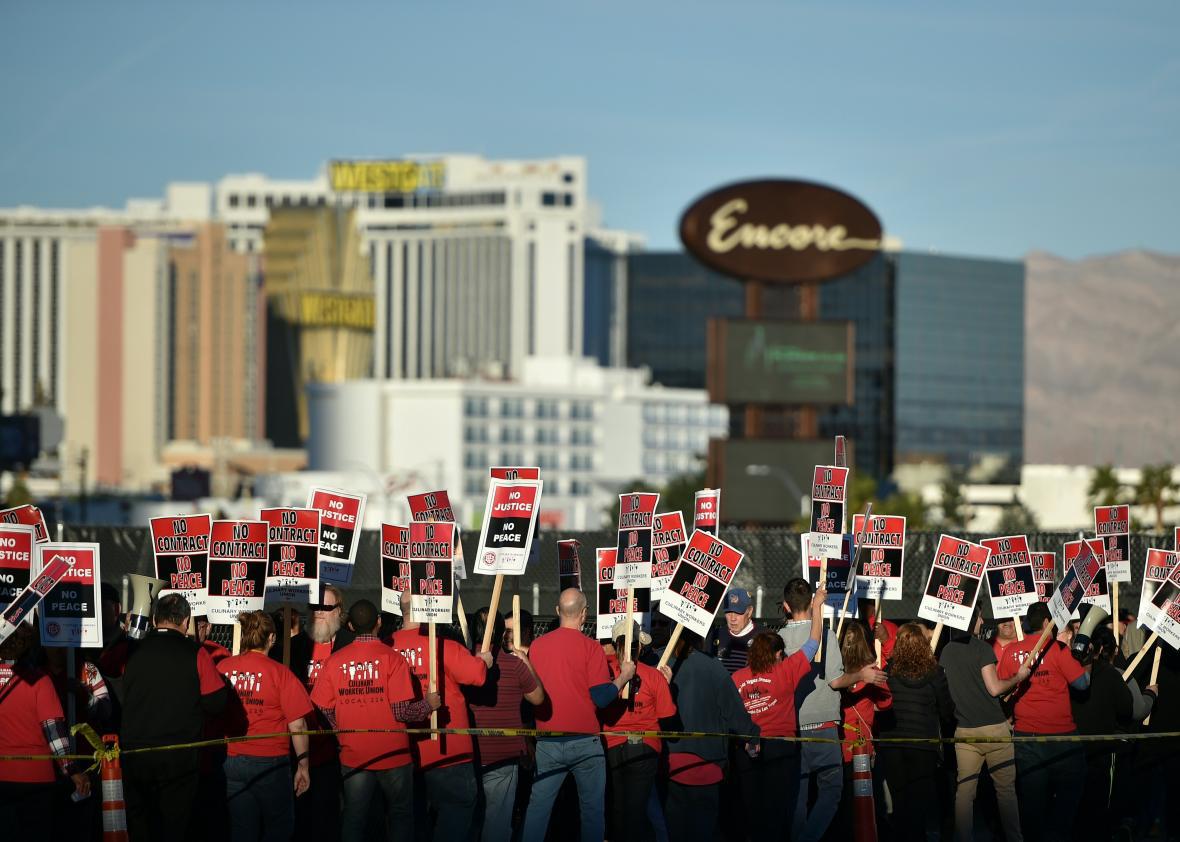It has been 11 months since 500 hotel workers at the Trump International Hotel in Las Vegas voted to join the Culinary Workers Union Local 226. They’d like to make as much money as their peers up and down the strip, and have access to better health care and a pension plan.
Trump Ruffin Commercial LLC, the company that runs the hotel and is co-owned by the president-elect and casino magnate Phil Ruffin, has opposed their efforts every step of the way. In the lead-up to the vote, the hotel company spent more than $500,000 on a union-busting consulting firm. After losing the vote, Trump’s company filed 15 complaints about the election, all of which were withdrawn or dismissed by the National Labor Relations Board. Three weeks ago, the NLRB ruled the hotel must recognize the union and that in refusing to do so it had been in violation of federal law. Trump and Ruffin have appealed that ruling to the U.S. Court of Appeals for the District of Columbia.
The union now finds itself in an unusual position twice over. First, this is the most confrontational stance that Local 226, which has 57,000 members in Nevada, has encountered from a major hotel. Second, its opponent—in court, and across the bargaining table—is the president-elect of the United States.
At a basic level, this will create a conflict of interest between the interests of Donald Trump the president and Donald Trump the businessman. We’ve already seen how the former can help the latter’s interests in Argentina and Scotland.* In the case of the Las Vegas hotel, the influence of the president will be more explicit.
Trump will soon have the power to fill the two vacant spots on the five-person NLRB, shifting the board’s composition to a Republican majority. He will later have the opportunity to appoint the board’s general counsel, who decides what cases come before the board. Those officials would then be in the position to rule on future disputes between the union and management at his hotel.
“The question for us is: Will Trump as president use the power he has to interfere given he has a financial interest in the outcome?” says Bethany Khan, a spokeswoman for the Culinary Workers Union in Las Vegas.
The NLRB is an independent federal agency with no enforcement power. Its ruling that Trump and Ruffin must begin to bargain with the union will be enforced or overturned by the D.C. Court of Appeals. Incidentally, the chief judge on that court is Merrick Garland, President Obama’s nominee for the Supreme Court. As a candidate, Trump had encouraged Republican senators not to hold hearings on Garland’s confirmation. Now, Garland will rule on Trump’s hotel while Trump will fill what might have been Garland’s place on the Supreme Court.
Trump will also (in time) appoint judges to the D.C. Circuit, which rules on cases brought against federal agencies like the NLRB, the Consumer Financial Protection Bureau, and the Environmental Protection Agency.
Finally, Trump (the hotel tycoon) could choose to appeal the D.C. Circuit’s judgment to the Supreme Court. The Supreme Court would probably not agree to hear the case. But if it did, the NLRB would be represented by the Justice Department, whose head would be appointed by Donald Trump (the president of the United States). Trump v. Trump.
The president is not subject to ethics laws that apply to other high-ranking officials. Trump has lately walked back an earlier assurance that he would put his assets in a “blind trust,” and it’s not clear to what extent he will relinquish control of his business empire. “In theory I could run my business perfectly and then run the country perfectly,” he told New York Times reporters Tuesday afternoon. His brand, he noted, is now “hotter” than ever before due to his recent electoral success.
Even if Trump felt it was the ethical thing to do to give up his ownership stake in the Las Vegas hotel, or to remove his name from the property, he has strong personal ties to his co-owner. Ruffin and Trump have known each other for nearly two decades. The president-elect introduced Ruffin to his current wife, former Miss Universe contestant Oleksandra Nikolayenko. Ruffin, then 72, married Nikolayenko, then 26, at a 2008 ceremony where Trump served as best man.
Given all these considerations, what will determine the course of bargaining at Trump’s Las Vegas hotel? Julius Getman, an expert on the history of labor law, says it will be good old-fashioned optics. “The law is less relevant here than the unusual political situation, and how seriously he takes his own claim to be the voice of working people, and whether his working-class supporters will support him on this,” Getman says.
Getman suggests that in the long run, though not in this particular case, Trump will exert the most influence on labor relations via court appointments. With regard to his Las Vegas hotel, Trump will get the kind of scrutiny than no anti-union manager ever relishes. That may be an advantage for Local 226, whose theatrical tactics—like lining up a wall of taco trucks outside the Trump Hotel in October—drew national attention during the campaign. Public confrontations with the union would stretch his claims to populism. Good-faith bargaining and a contract, by contrast, could provide a valuable moment of presidential PR.
*Correction, Nov. 28, 2016: This post originally misstated that Donald Trump had used his election to advance his business interests in England. The golf course in question is in Scotland.
